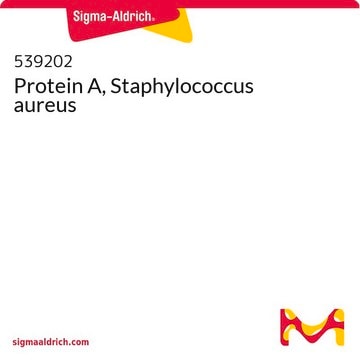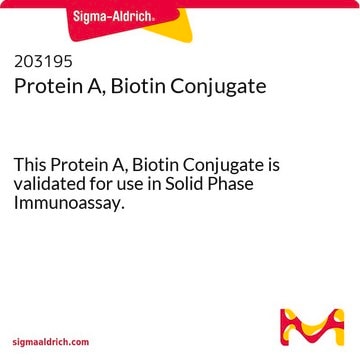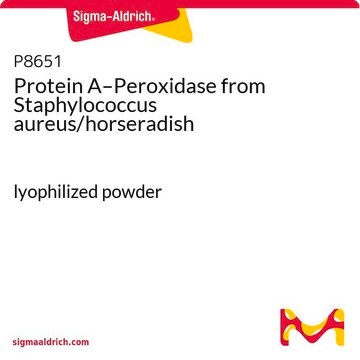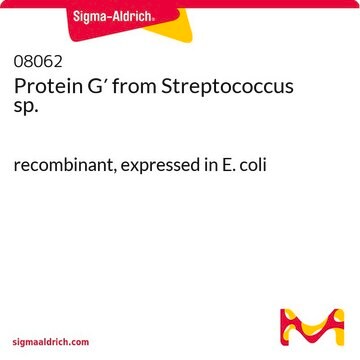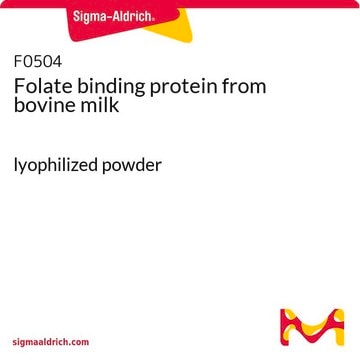P2165
Protein A–Biotin from Staphylococcus aureus
lyophilized powder
Bejelentkezésa Szervezeti és Szerződéses árazás megtekintéséhez
Összes fotó(1)
About This Item
Javasolt termékek
konjugátum
biotin conjugate
Minőségi szint
200
300
form
lyophilized powder
összetétel
Protein, ≥70% biuret
a címkézés mértéke
3.0-8.0 mol biotin per mol Protein A
tárolási hőmérséklet
2-8°C
Általános leírás
Protein A (SpA) is a 42kDa virulence factor produced by Staphylococcus aureus, and is composed of five highly homologous consecutive extracellular Ig-binding domains, namely domains E, D, A, B, and C. This protein is present in both secreted and membrane-associated forms.
Egyediség
Binds IgG only from most mammals, except rat, goat, and sheep
Biokémiai/fiziológiai hatások
Protein A (SpA) causes B cells death in vitro, by binding to the Fc region of antibody and the Fab regions of the B-cell receptor, thus inhibiting its opsonophagocytosis. This protein is thought to be implicated in the evasion of host immune responses by Staphylococcus aureus, and thus, might be a candidate for vaccine development approaches to prevent severe S. aureus infections. S. aureus is responsible for nosocomial infections as well as a variety of human infections, such as food poisoning, toxic shock syndrome, endocarditis, septicemia, skin infections, soft tissue infections, and bone infections. It is also responsible for bovine and ovine mastitis. SpA typing or DNA sequence analysis of the variable repeat region of protein A gene is useful in determining S. aureus outbreak strains from those strains that are epidemiologically insignificant.
Fizikai forma
Lyophilized powder containing sodium citrate
Elkészítési megjegyzés
Prepared from P 6031, coupled to biotin by an amide bond through an aminocaproyl spacer.
Jogi nyilatkozat
Unless otherwise stated in our catalog or other company documentation accompanying the product(s), our products are intended for research use only and are not to be used for any other purpose, which includes but is not limited to, unauthorized commercial uses, in vitro diagnostic uses, ex vivo or in vivo therapeutic uses or any type of consumption or application to humans or animals.
Analitikai tanúsítványok (COA)
Analitikai tanúsítványok (COA) keresése a termék sarzs-/tételszámának megadásával. A sarzs- és tételszámok a termék címkéjén találhatók, a „Lot” vagy „Batch” szavak után.
Már rendelkezik ezzel a termékkel?
Az Ön által nemrégiben megvásárolt termékekre vonatkozó dokumentumokat a Dokumentumtárban találja.
Az ügyfelek ezeket is megtekintették
M Balasch et al.
Journal of comparative pathology, 121(2), 139-148 (1999-07-16)
This report describes the experimental inoculation of conventional pigs with a tissue homogenate obtained from two pigs affected with postweaning multisystemic wasting syndrome (PMWS). Eight 2-month-old pigs were inoculated by the intranasal route, and two pigs were left as uninfected
Anil K Pal et al.
Biosensors, 10(10) (2020-09-30)
We report a novel self-referenced diffraction-based leaky waveguide (LW) comprising a thin (~2 µm) film of a photofunctionalisable hydrogel created by covalent attachment of a biotinylated photocleavable linker to chitosan. Streptavidin attached to the chitosan via the photocleavable linker was
spa typing method for discriminating among Staphylococcus aureus isolates: implications for use of a single marker to detect genetic micro- and macrovariation.
Koreen L et al
Journal of Clinical Microbiology, 42(2), 792-799 (2004)
Regina Stoltenburg et al.
International journal of molecular sciences, 19(2) (2018-03-03)
New, as yet undiscovered aptamers for Protein A were identified by applying next generation sequencing (NGS) to a previously selected aptamer pool. This pool was obtained in a classical SELEX (Systematic Evolution of Ligands by EXponential enrichment) experiment using the
Scott D Kobayashi et al.
mBio, 4(5), e00764-e00713 (2013-10-03)
Staphylococcus aureus is a prominent cause of human infections worldwide and is notorious for its ability to acquire resistance to antibiotics. Methicillin-resistant S. aureus (MRSA), in particular, is endemic in hospitals and is the most frequent cause of community-associated bacterial
Tudóscsoportunk valamennyi kutatási területen rendelkezik tapasztalattal, beleértve az élettudományt, az anyagtudományt, a kémiai szintézist, a kromatográfiát, az analitikát és még sok más területet.
Lépjen kapcsolatba a szaktanácsadással
